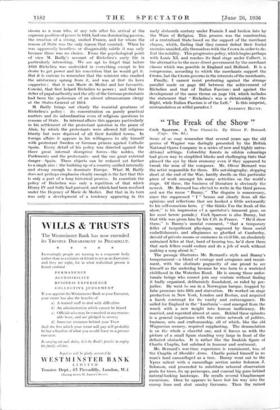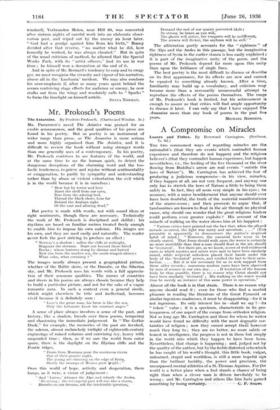" The Freak of the Show
SOME of us may remember that several years ago the old genius of Wagner was daringly presented by the British National Opera Company in a series of new and highly untra- ditional settings. Cobwebby forests in oilskin colourings had given way to simplified blocks and challenging tints that pleased the eye by their economy even if they appeared to tweak the nose of the composer. Mr. Oliver Bernard was the artist responsible for them. His autobiography, stopping short at the end of the War, hardly dwells on this particular piece of work amongst his many activities on the world's stage. Of these, the business of literature is obviously the newest. Mr. Bernard has elected to write in the third person and use the name " Bunny.. " .The disguise is unnecessary, since the suppressed " I " beams out clearly from all the opinions and reflections that are hooked a little awkwardly to his self-conscious hero. (" She thinks Fm the freak of the show," is his impression c f a spectator's innocent gaze, on his most heroic parade.) Cock Sparrow is also Bunny, but that title was given him by his C.O. in France. " He'd show them," is Bunny's mental comment, " that a temporary feller of insignificant physique, ungraced by those social embellishments and allegianCes so glorified at Camberley, devoid of private means or eminence in civil life, an absolutely untrained feller at that, hard of hearing too, he'd show them that such fellers could endure and do a job of work without making a song about it."
The passage illustrates Mr. Bernard's style and Bunny's temperament—a blend of courage and arrogance and resent- ment, with the obstinate pugnacity of one proud to see himself as the underdog because he was born to a wretched childhood in the Waterloo Road. He is among those unfor- tunate beings who cannot join any venture without finding it badly organised, deliberately fraudulent, or ruled by pre- judice. He went to sea in a Norwegian barque, trapped by false promises into filth and starvation. He worked on stage production in New York, London and Boston, and acquired a harsh contempt for its vanity and extravagance. He sailed for England in the Lusitania '—and emerged from the wreck with a new insight into human inefficiency. He married, and repented almost at once. Behind these episodes is a general impatience with the entire network of politics, business, arts and craftsmanship, all of which, like the old Wagnerian scenery, required supplanting. The denunciation is on the whole a cheerful one, and it leaves us with the picture of a small figure standing very large in front of the defeated obstacles. It is rather like the freakish figure of Charlie Chaplin, but subdued in humour and sentiment.
Mr. Bernard's war-time experience is reminiscent, too, of the. Chaplin of Shoulder Arms. Charlie poged himself in no man's land camouflaged as a tree. Bunny went out to the Ypres salient with a camouflage section under Solomon J. Solomon, and proceeded to substitute arboreal observation posts for trees, fix up periscopes, and conceal big guns behind natural-looking landscape. He recalls several Chaplinesque excursions. Once he appears to have lost his way into the enemy lines and shot sundry cermans. Then the ruined
windmill, Verbranden Molen, near Hill 60, was converted after sixteen nights of careful work into an elaborate obser- vation post, and wiped out by the enemy an hour later. " God had a grudge against him from his birth," Bunny decided after that reverse, " no matter what he did, how honestly he worked, he was always cheated." But in spite of the usual criticism of method, he allowed that the Special Works Park, with its " artist officers," had its use in war time ; he himself won a decoration at the end of it.
And in spite of Mr. Bernard's tendency to carp and to swag- ger, we must recognise the vivacity and vigour of his narrative, above all in the Lusitania ' incident. We may also condone his over-emphasis if, after so many years spent behind the scenes contriving stage effects for audience or enemy, he now stalks out from the wings and resolutely calls to " Sparks " to focus the limelight on himself awhile. SYLVA NORMAN.











































 Previous page
Previous page